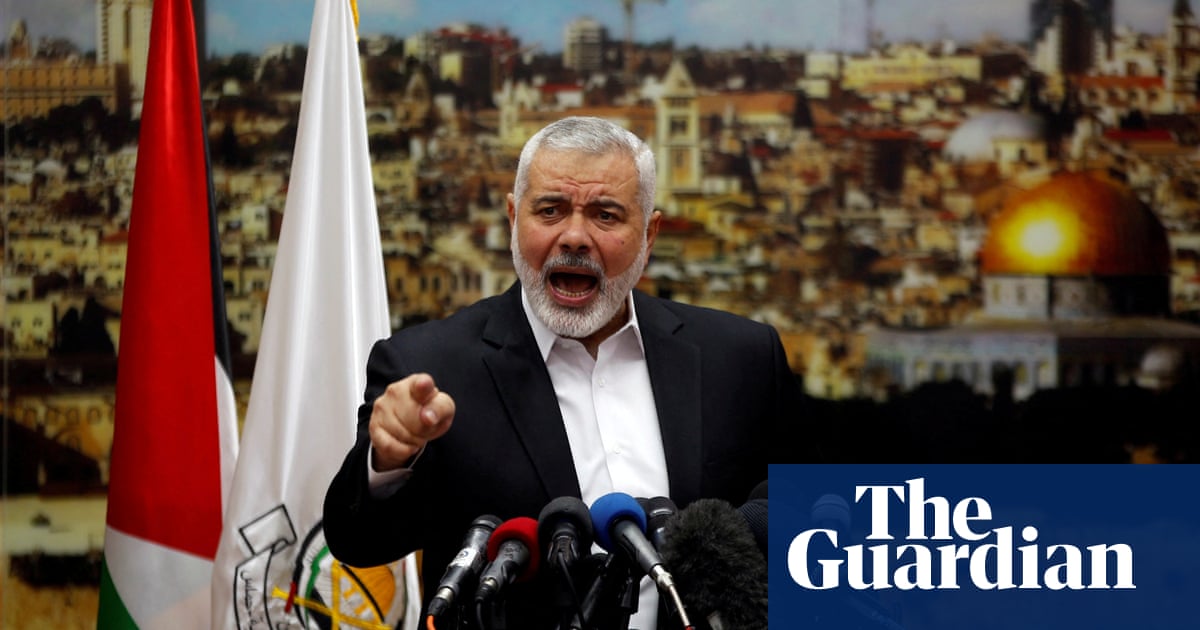Ismail Haniyeh, the political leader of Hamas, has been killed by a strike in Tehran in the early hours of Wednesday morning, the group said, only hours after Israel claimed it had killed a top Hezbollah commander in Beirut.
Hamas blamed Israel for Haniyeh’s death, which one official described as a “grave escalation”. It said he was targeted at his residence in Tehran, after participating in the inauguration ceremony of the new Iranian president.
The dual assassinations are heavy blows to Hamas and Hezbollah, but also raise the stakes for Iran, which backs both groups. They will fuel growing fears that the war in Gaza could escalate into a broader regional conflict.
Iran’s new president, Masoud Pezeshkian, posted on X shortly after the country’s top security council met to discuss responses that his country would defend its territorial integrity and honour, and make the “terrorist occupiers regret their cowardly action”.
The US defence secretary, Lloyd Austin, said the US was “doing things to take the temperature down” but would come to Israel’s defence if it was attacked.
The Israeli military declined to comment on Haniyeh’s death. Israel vowed to kill all Hamas leaders after the 7 October attacks and its intelligence services have a history of carrying out covert killings inside Iran, mostly targeting scientists from the country’s nuclear programme.
Haniyeh’s killing was “a grave escalation that will not achieve its goals”, the Hamas official Sami Abu Zuhri told Reuters.
Hamas has survived past assassinations of its top leaders, including Haniyeh’s mentor Ahmed Yassin in 2004, and Haniyeh did not command operations on the ground in Gaza, after leaving for exile in 2019.
Hamas fighters inside Gaza are led by Yahya Sinwar, thought to be the mastermind of the 7 October attacks in which about 1,200 people were killed and 250 others were taken hostage.
US officials have for months been leading a global diplomatic effort to prevent the war in Gaza escalating into a broader and even more dangerous regional conflict.
Austin, who is visiting the Philippines, said that even after the assassinations he believed a wider conflagration in the Middle East would be avoided. “I don’t think war is inevitable. I maintain that. I think there’s always room and opportunities for diplomacy,” he told reporters onboard a navy ship.
Recently the Biden administration had pushed hard for at least a temporary ceasefire and hostage-release deal in Gaza, where Israel’s war since 7 October has killed nearly 40,000 Palestinians and wounded more than 90,000, health authorities in Gaza say.
The CIA director, Bill Burns, was in Rome on Sunday for a round of talks with officials from Israel, Qatar and Egypt, negotiations likely have been thrown into disarray by the overnight attacks.
Iranian state television said Haniyeh’s death would delay a ceasefire in Gaza by several months and prompt a retaliation from Iran-backed militant groups in the region, the New York Times reported.
Haniyeh’s death came hours after Israel claimed it killed Hezbollah’s top military commander, Fuad Shukur, in an airstrike on a south Beirut suburb launched in retaliation for a rocket attack that killed 12 children at the weekend.
Hezbollah confirmed on Wednesday that Shukur was in the apartment building hit by Israel, but said it was still waiting for news about his fate.
“Civil defense teams have been working diligently, but slowly, to remove the rubble due to the state of the destroyed layers,” the group said in a statement. “We are still waiting for the result.”
Lebanon’s foreign minister said the strike in Beirut was a shock, after assurances from Israel’s allies that the country was planning a “limited response” that “would not produce a war”.
“That’s what we’re afraid of, and hopefully this will not produce a war,” Abdallah Bou Habib told the Guardian. “We did not expect to be hit in Beirut. We thought these were red lines that the Israelis would respect.”
On Wednesday morning, Russia and Turkey condemned Haniyeh’s assassination, with Moscow describing it as a “completely unacceptable political killing”, the Tass news agency reported.
Qatar, which hosts Hamas’s political office and has played a key role in Gaza ceasefire negotiations, said the attack was a “dangerous escalation” that together with attacks on civilians in Gaza was leading the region toward chaos.
The Palestinian president, Mahmoud Abbas, condemned Haniyeh’s assassination, calling it a “cowardly act and dangerous development”. Streets in Ramallah, where the Palestinian Authority is based, were empty after Palestinian national and Islamic factions called for a general strike and mass demonstrations.
Haniyeh had repeatedly urged Palestinians to be “steadfast” after Israel killed his mentor and members of his family; his own death is likely to elicit a similar response from other Hamas leaders.
In April, when an airstrike killed three of his sons and four grandchildren he insisted in an interview with Al Jazeera that his personal loss would not pressure Hamas to shift its position in negotiations.
Inside Israel, the military said it was assessing the situation, but the home defence policy – which calls on citizens to prepare for potential attacks – had not been changed. The country’s northern airspace was completely closed apart from emergency flights, local media reported.

